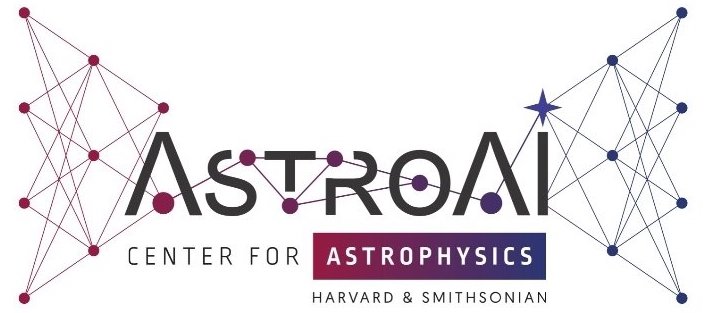AstroAI Lunch Talks - February 12, 2024 - Bill Freeman
05 Feb 2024 - Joshua Wing
The video can be found here: https://www.youtube.com/watch?v=ovZu9jlZv1s
Speaker: Bill Freeman
Title: Event-horizon-scale Imaging of M87* under Different Image Assumptions, using Deep Generative Image Priors
Paper Authors: Berthy Feng, Katherine Bouman, and William Freeman
Abstract: The data from astronomical imaging are nearly always incomplete, and prior assumptions are required to form images. The Event Horizon Telescope’s (EHT) radio interferometric observations of M87*, the super-massive black hole at the center of the galaxy M87, require such prior assumptions about images in order to reconstruct images for interpretation. In the initial papers of their 2017 observations, the EHT collaboration explored different image assumptions within different imaging pipelines (e.g. CLEAN and regularized maximum likelihood methods). In this work, we fix the pipeline and change only one aspect of the reconstructions: the image prior.
Using a score-based diffusion model, we trained four different image priors, based on images from these datasets: CIFAR-10 (generic natural images), general relativistic magneto-hydrodynamic (GRMHD) simulations, radially inefficient accretion flow (RIAF) simulations, and CelebA (celebrity faces). This gives (a) a collection of possible M87* reconstructions using each of these different training sets, and (b) an analysis of which black-hole features are robust to the choice of image prior.
I’ll give some background on diffusion models, and present the M87* reconstructions under the different image priors, for comparison also showing reconstructions from synthetic data with known sources. While I’m a co-author, this work is primarily by Berthy Feng and her PhD supervisor, Katie Bouman, both at CalTech.
Bio: William T. Freeman is the Thomas and Gerd Perkins Professor of Electrical Engineering and Computer Science (EECS) at MIT, and a member of the Computer Science and Artificial Intelligence Laboratory (CSAIL) there. He was the Associate Department Head of EECS from 2011 - 2014. Since 2015, he has also been a research manager in Google Research in Cambridge, MA. He is interested in mid-level vision, audio, and computational photography. Previous research topics include steerable filters and pyramids, orientation histograms, the generic viewpoint assumption, color constancy, computer vision for computer games, motion magnification, and belief propagation in networks with loops. He received outstanding paper awards at computer vision or machine learning conferences in 1997, 2006, 2009, 2012 and 2019, and test-of-time awards for papers from 1990, 1995, 2002, 2005, and 2012. He shared the 2020 Breakthrough Prize in Physics for a consulting role with the Event Horizon Telescope collaboration, which reconstructed the first image of a black hole. He is a member of the National Academy of Engineering, and a Fellow of the IEEE, ACM, and AAAI. In 2019, he received the PAMI Distinguished Researcher Award, the highest award in computer vision.
Watch the talk below!
